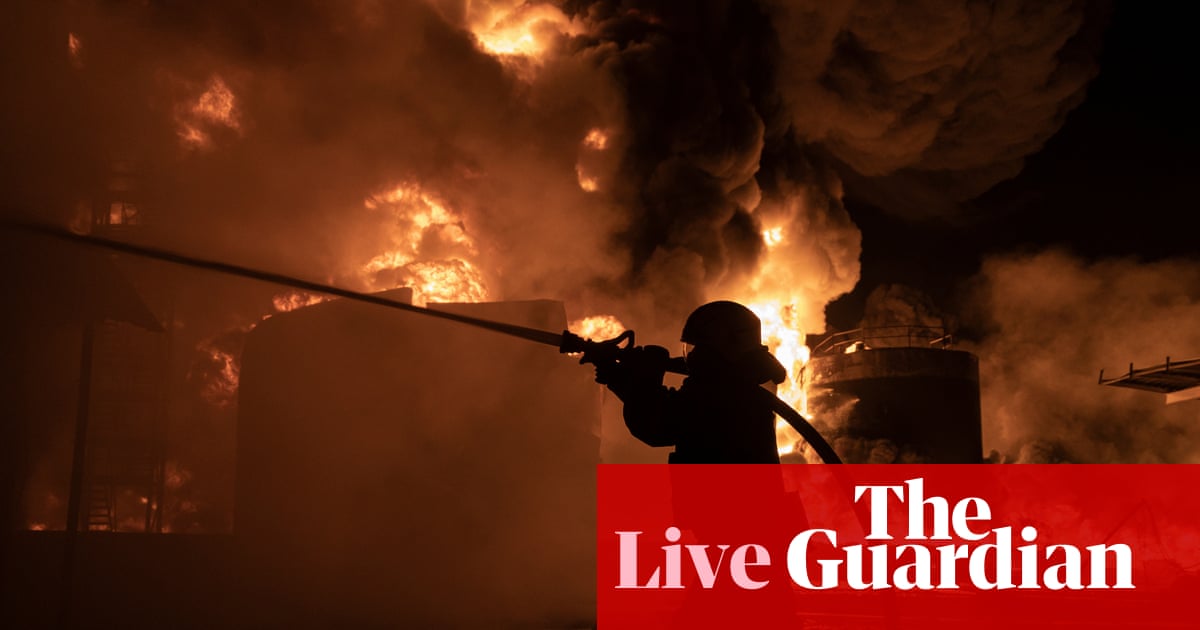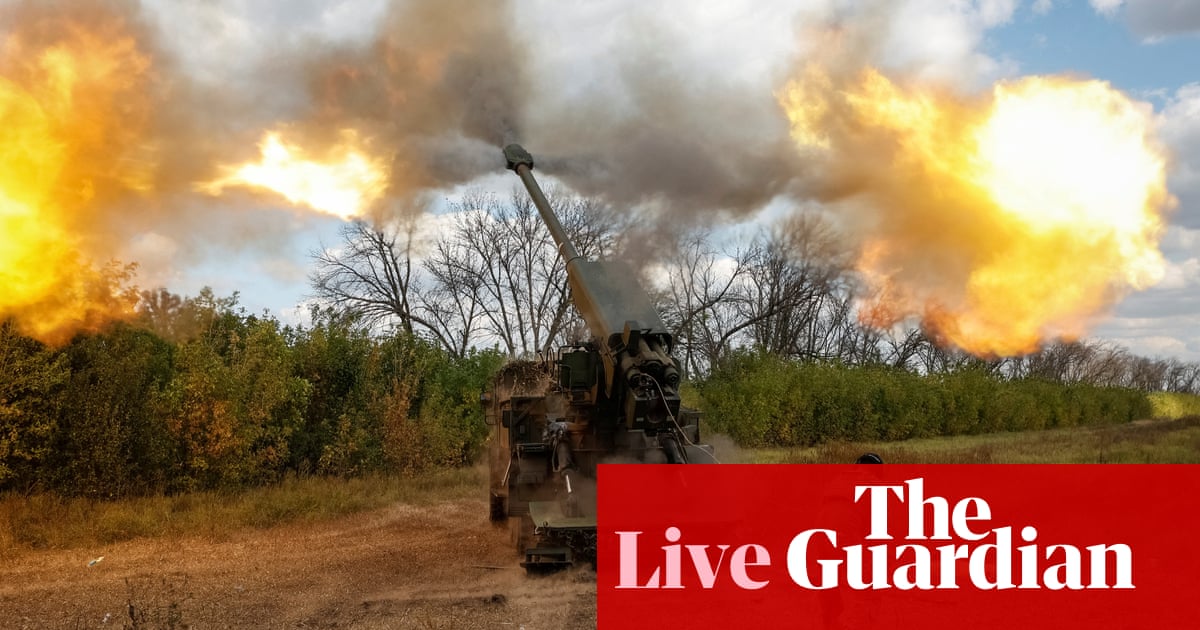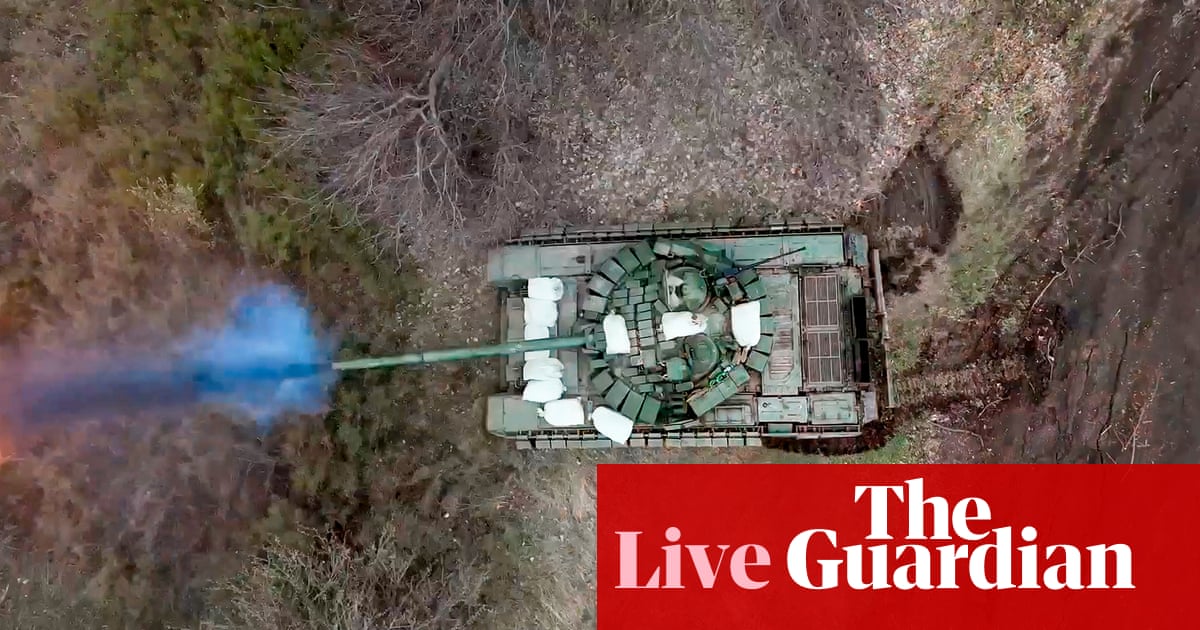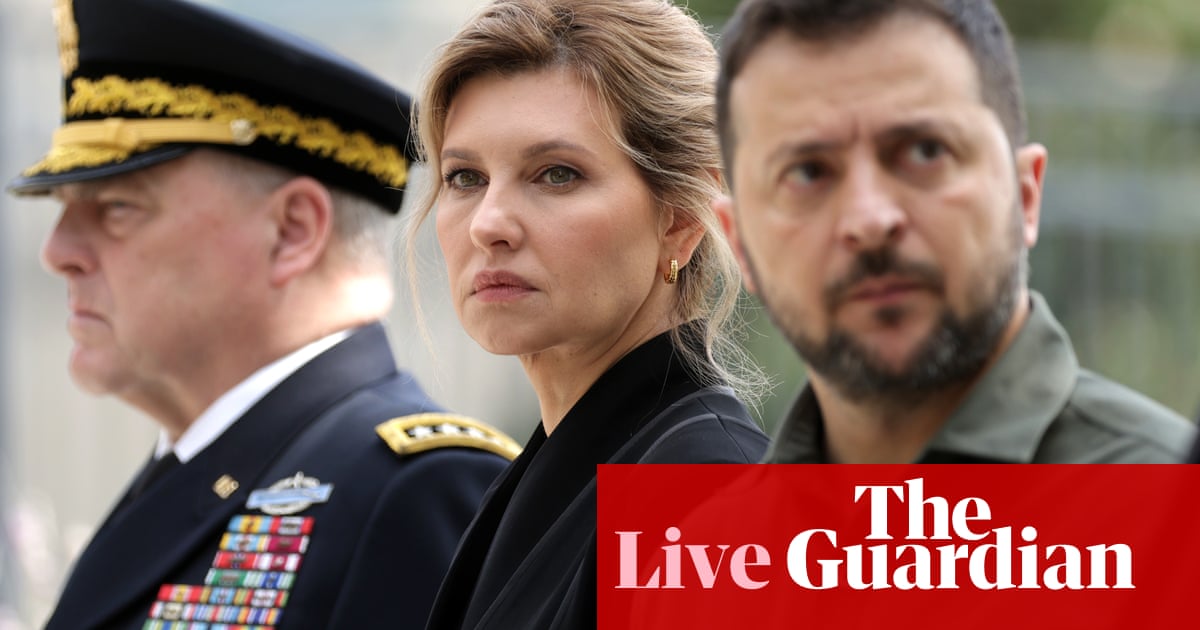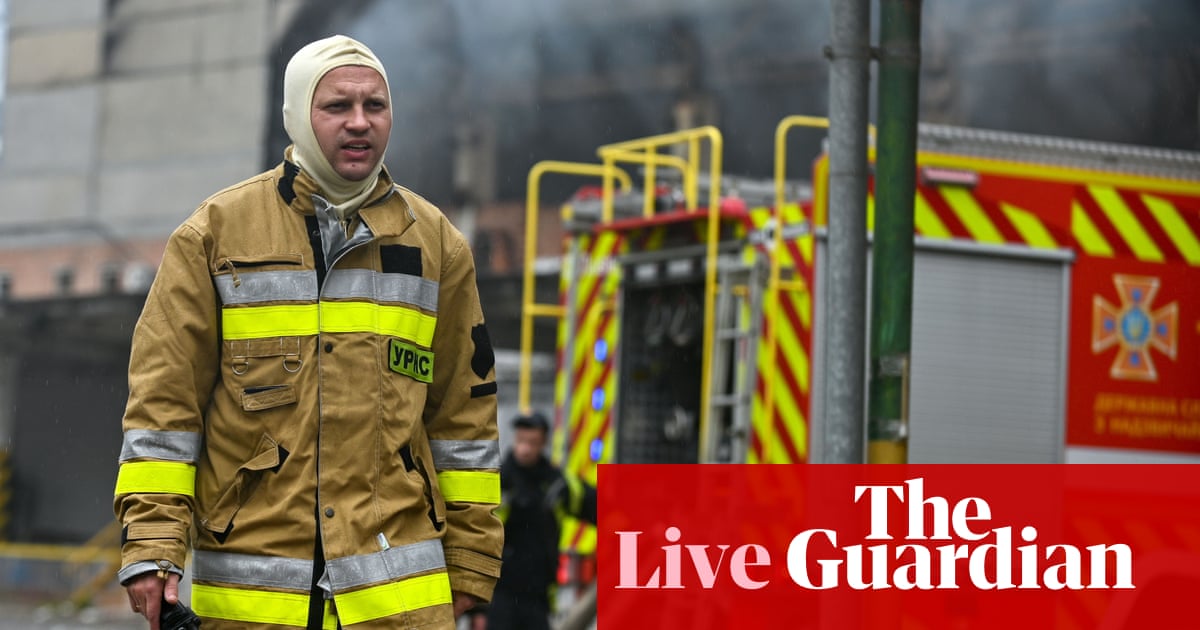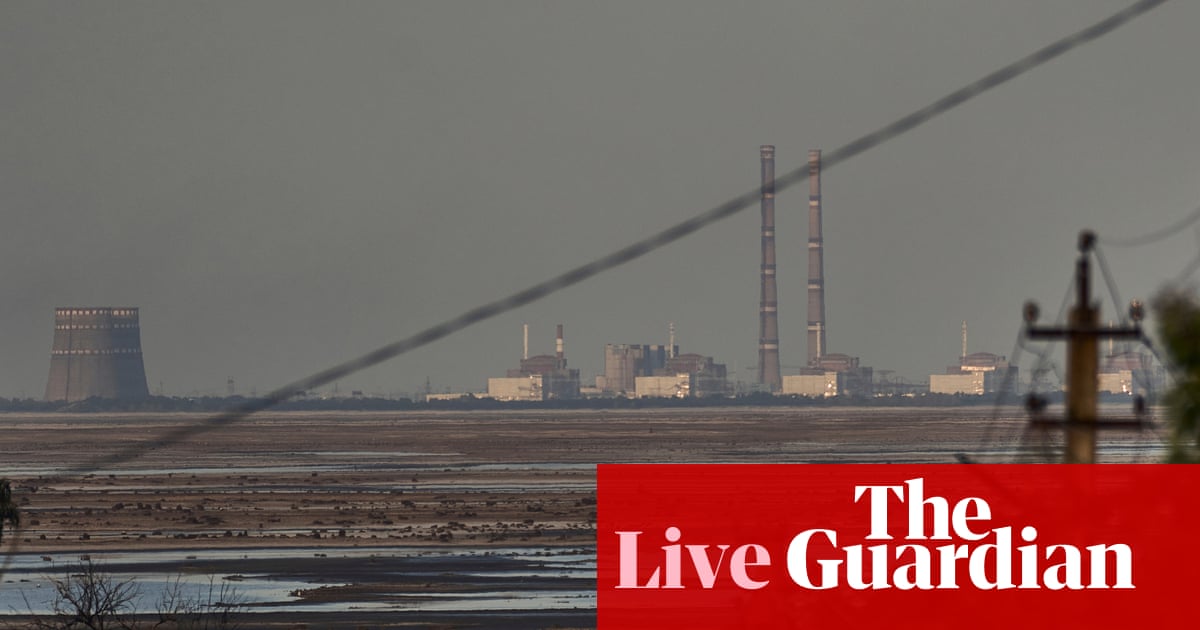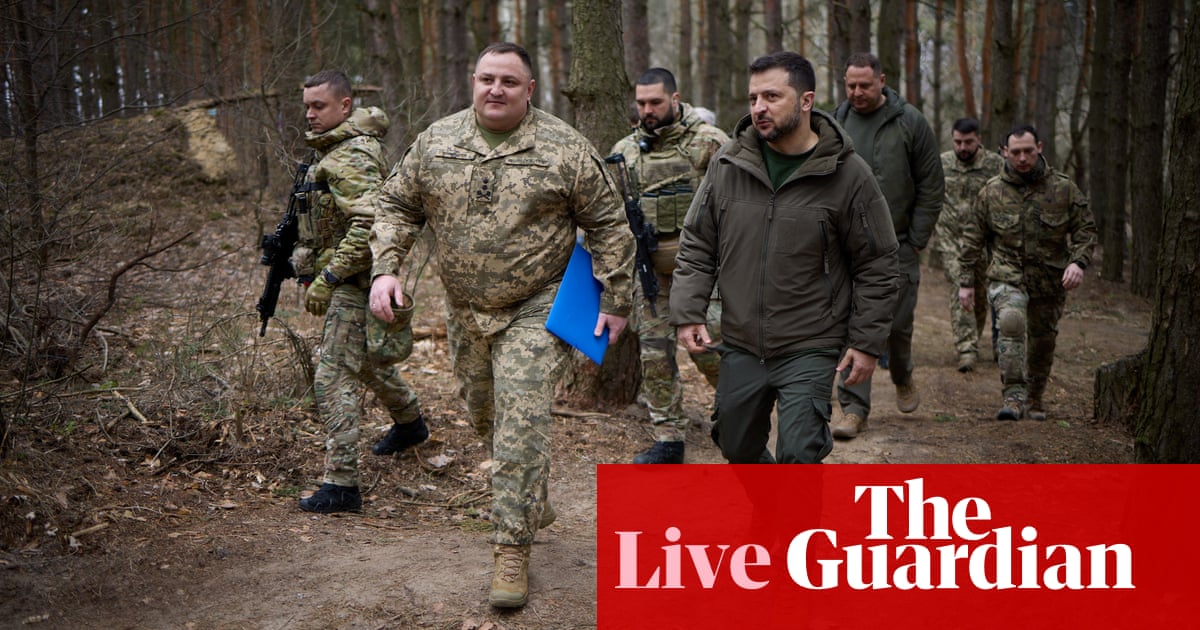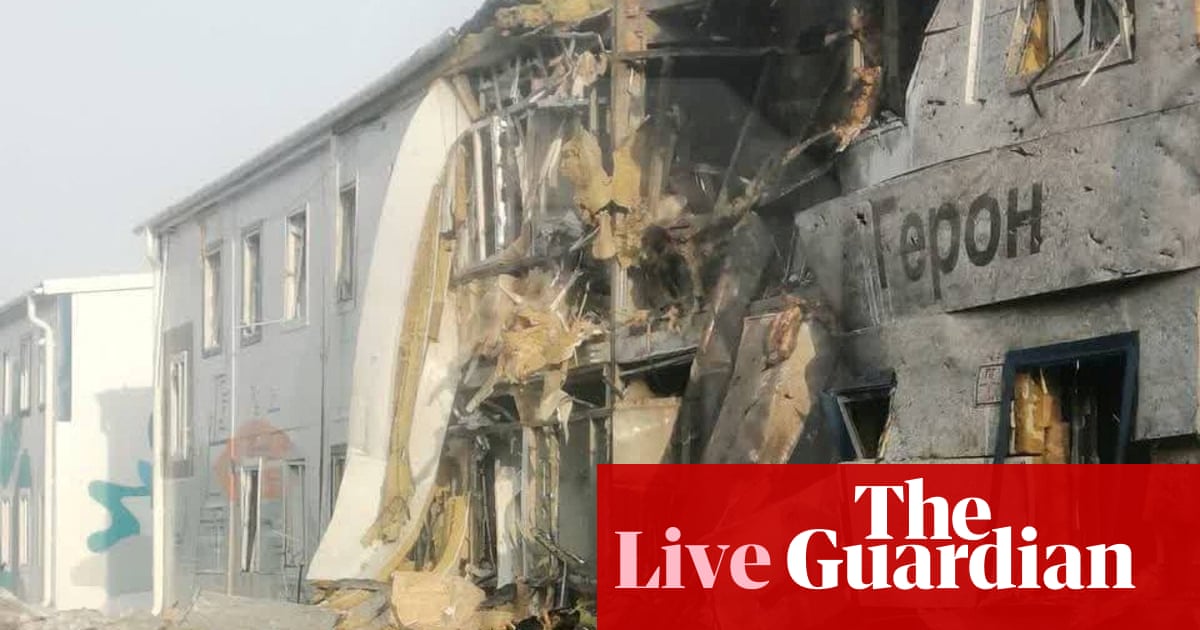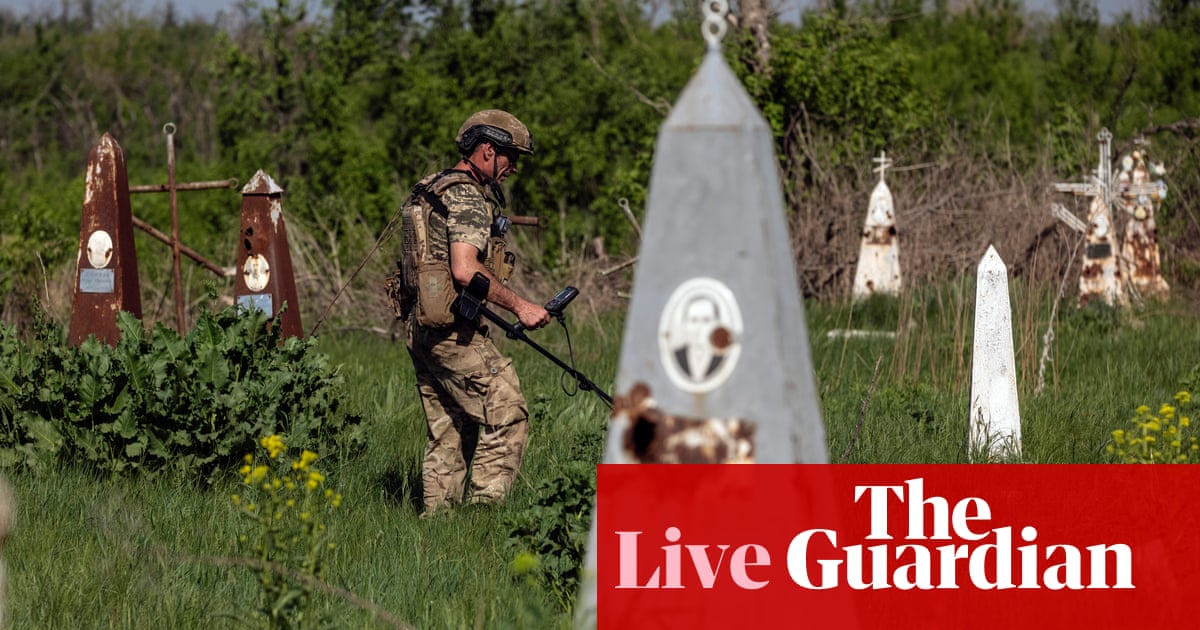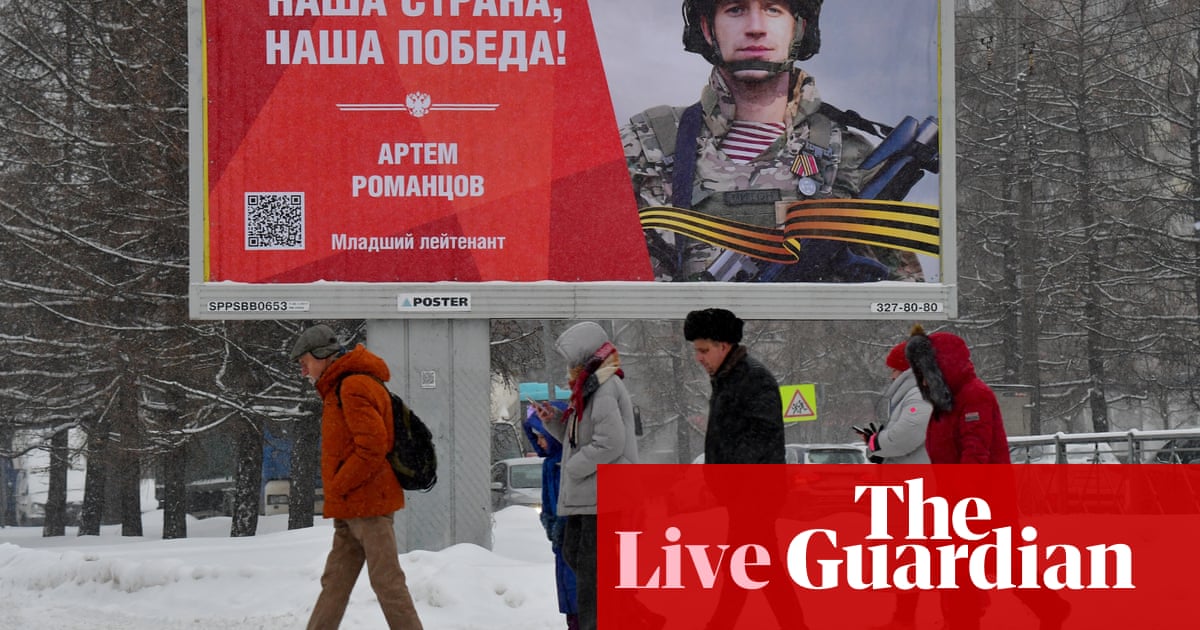
Russian forces take control of Vesele in Ukraine‘s eastern Donetsk region, says Russian defence ministry
Russian forces have taken control of Vesele, a settlement in Ukraine’s eastern Donetsk region, reports Reuters citing a statement by Russia’s defence ministry on Thursday.
The ministry provided no details about the settlement. It said only that the village had been taken by what it called the active efforts of units which are part of Russia’s southern military group. Reuters was unable to verify the battlefield assertion.
A village with the same name, populated by about 100 people, is located 20km (12 miles) north-east of the Russian-controlled city of Bakhmut in an area which has seen intense fighting.
Summary of the day
Thank you for following the Russia-Ukraine war live blog today. It will be closed shortly but you can continue to follow the latest news on Ukraine here and on Russia here. Below is a closing summary of today’s key posts:
A Ukrainian drone attack hit an oil terminal in St Petersburg on Thursday as part of a “new phase” of in the region a Ukrainian military source told news agency Reuters. Reuters could not independently verify the statement but the Kyiv Independent had also reported the news.
Russian forces have taken control of Vesele, a settlement in Ukraine’s eastern Donetsk region, Russia’s defence ministry told Reuters on Thursday. The ministry provided no details about the settlement. Reuters was unable to verify the battlefield assertion.
Ukraine has bought six Caesar howitzers, France’s defence minister Sebastien Lecornu said on Thursday. In Ukraine’s first purchase of French-made weapons since the start of the war, Lecornu said Kyiv had bought six for €3m-€4m ($3.3m -$4.4m) each.
Russian foreign minister, Sergei Lavrov, held his annual briefing on Thursday in Moscow. In the near three-hour long news conference, he said Russia’s “special military operation” in Ukraine had “brought about a certain purification of [Russian] society” and made it “healthier”. He also said Russia “can no longer trust the west”.
Ukraine will not decide on conditions to end the conflict as “Washington is calling the shots” said Lavrov at his annual briefing in Moscow. On the security cooperation agreement recently announced by the UK and Ukraine, Lavrov called it a “half-baked product” containing no “legally binding agreements”. He added that not the “slightest interest” has been shown by the US and other western nations in ending the war.
Lavrov claimed the US and other western countries were being surpassed by “emerging and strengthening centres of economic growth, financial power and political influence”, although he was not specific about which countries. Lavrov also said Russia’s relations with China were at “their best period in history”.
Hungarian prime minister, Viktor Orbán called for EU support to Ukraine to be reviewed annually. Orbán criticised “liberal” politicians for wanting “to give money to Ukraine over four years”, claiming it would be “anti-democratic” to do so just ahead of European parliament elections in June.
Orbán’s chief of staff, Gergely Gulyas said Hungary was in talks with the EU about Ukraine aid but it was not certain an agreement would be reached. Failing that, he said, the EU’s other 26 members could reach a solution without Hungary.
Russia has blamed separatist “traitors” from abroad who want to start a “partisan war” for the protests that took place on Wednesday in the small town of Baymak in Bashkortostan after local activist Fail Aslynov was jailed for four years.
Estonia said it would not renew the residence permit of the head of the Estonian Orthodox church of the Moscow patriarchate, Metropolitan Eugene, saying the Russian national was “a security risk”.
Nuclear envoys of South Korea, the US and Japan condemned North Korea for its arms trade with Russia, recent missile tests, and increasingly hostile rhetoric at a meeting in Seoul on Thursday. Japan’s envoy, Hiroyuki Namazu, condemed Pyongyang’s ballistic missile launch and said there must be close monitoring of what Russia may be providing to North Korea in return for armaments.
Russian forces launched 33 Iranian-designed attack drones at Ukraine overnight, and fired guided missiles at its second largest city of Kharkiv in the east, said Ukraine’s air force on Thursday. It added that its air defence systems had downed 22 of the drones and that Russian forces had also fired two S-300 anti-aircraft guided missiles from the Belgorod border region.
Schools in western Ukraine are rolling out rifle and pistol shooting practice using interactive software, a regional official said. The governor of the western Ivano-Frankivsk region Svitlana Onyshchuk said: “Prykarpattia high school students will learn shooting on safe interactive systems at Defence of Ukraine classes.” She says the training will be introduced in three dozen schools in the western region.
Russia has filed charges against 68 foreign mercenaries for fighting for Ukraine, according to the Russian state-run Tass news agency, which cites a statement sent by to it by Russia’s investigative committee (IC).
Russian state prosecutors asked a Moscow court on Thursday to sentence prominent nationalist Igor Girkin to five years in prison for inciting extremism. Regarded in the west as a war criminal, Girkin has publicly accused Putin and top army officials of not pursuing the war in Ukraine harshly or effectively enough.
Cyprus is making an “extremely important” contribution in increasing sanctions pressure on Moscow, Ukraine’s ambassador to the east Mediterranean island, Ruslan Nimchynskyi said on Thursday.
The US and its allies are looking for a way to unfreeze $300bn in Russian central bank funds sitting mostly in Europe and use them for the benefit of Ukraine.
Romanian farmers blocked a crossing on the Romanian-Ukrainian border on Thursday, Ukraine’s state customs service said. The Ukrainian state customs service said that traffic leaving Ukraine for trucks has been temporarily suspended to prevent passenger cars from being blocked.
The Russian city of Belgorod, near the Ukrainian border cancelled its traditional Orthodox Epiphany festivities on Friday due to the threat of attacks as Kyiv’s forces pursue a new strategy.
Russia has blamed separatist “traitors” from abroad who want to start a “partisan war” for the protests that took place on Wednesday in the small town of Baymak in Bashkortostan after local activist Fail Aslynov was jailed for four years.
Alsynov, who has campaigned for the protection of the Bashkir language and co-founded a now banned organisation, was convicted of “inciting hatred.”
“You can wear a mask of a good eco-activist, a patriot, but this is not the case,” local governor Radiy Khabirov said, reports AFP. His remarks came as the first of those arrested at the protest were sentenced.
According to AFP, eight protesters were handed short-term jail sentences on Thursday. Investigators had launched criminal cases on the grounds of “mass rioting” and assaulting police officers – charges which carry maximum penalties of up to 15 years.
The protesters had insisted in social media videos that they were not “extremists” and some carried flags of the republic at the protest.
“There is a group of people, some of whom are abroad, who are de facto traitors and call for the separation of Bashkortostan from Russia,” Khabirov said. “They are calling for partisan war here.”
Khabirov singled out Ruslan Gabbasov – an exiled Bashkir activist – as fuelling separatism in Bashkortostan.
Gabbasov, speaking via video link at a news conference in Ukraine on Thursday, said that he wanted Russia to “fall apart”. He asked Kyiv to create a Bashkir battalion to fight for Ukraine to gain military experience before going back to Russia like “Fidel Castro’s disembarkation in Cuba”.
Gabbasov warned of more protests in Bashkortostan, adding that the authorities had turned the region into a “colony” for the extraction of raw materials. The Russian authorities have warned people not to give in to provocations.
Russia has filed charges against 68 foreign "mercenaries" for fighting for Ukraine
Russia has filed charges against 68 foreign mercenaries for fighting for Ukraine, according to the Russian state-run Tass news agency, which cites a statement sent by to it by Russia’s investigative committee (IC).
“In the criminal case on mercenary activities, investigators received additional materials and filed charges in absentia against 68 more nationals from seven countries,” the statement said.
Tass says the committee noted that criminal proceedings were already under way against 591 foreign citizens from 46 countries. Most of them are citizens of the US, Canada, Georgia, Israel, the UK, Germany, Lithuania and Latvia, according to the IC.
Russian state prosecutors asked a Moscow court on Thursday to sentence prominent nationalist Igor Girkin to five years in prison for inciting extremism, reports Reuters citing information published by the RIA news agency.
Girkin, regarded in the west as a war criminal, publicly accused Putin and top army officials of not pursuing the war in Ukraine harshly or effectively enough.
Ukraine has bought six Caesar howitzers, says France’s defence minister
Ukraine has bought six Caesar howitzers, France’s defence minister said on Thursday, reports Reuters.
Speaking to France Inter radio, Sebastien Lecornu said that Paris would send 50 precision-guided missiles a month to Kyiv to aid its fight against Russia’s invasion. He also said that Caesar manufacturer, Nexter, had managed to halve the production time of the howitzer to 15 months meaning that about 78 units would be available this year.
In Ukraine’s first purchase of French-made weapons since the start of the war, Lecornu said Kyiv had bought six for €3m-€4m ($3.3m -$4.4m) each. Ukraine currently has 49 Caesar self-propelled howitzers given by France and Denmark.
Lecornu later told reporters that France would also spend €50m from a fund it had created for Ukraine to buy a further 12 Caeser cannon that it would then send to Kyiv.
He said he hoped allies would buy 60 Caesars for about €285m. “We want to share the bill and enable European countries to share the financial burden,” Lecornu said.
The Ukrainian president, Volodymyr Zelenskiy, said on Thursday he had thanked French president, Emmanuel Macron, in a phone call for Paris committing to the production of dozens of Caesar howitzers and ammunition this year.
Macron will head to Ukraine in February to complete a deal under which Paris would deliver more sophisticated weaponry, including long-range cruise missiles, and provide long-term political, aid and reconstruction commitments.
The Russian city of Belgorod, near the Ukrainian border cancelled its traditional Orthodox Epiphany festivities on Friday due to the threat of attacks as Kyiv’s forces pursue a new strategy, reports the Associated Press.
Citing information from the Russian state-run Tass news agency, AP says that events planned for Friday, in which the faithful plunge into ponds and pools through holes in the ice on the feast of Epiphany, have been scrapped. The annual celebrations on the 19 January are widespread in Russia.
Cross-border attacks have become increasingly frequent in recent weeks in Belgorod, the largest Russian city near the border with about 340,000 people. On 30 December, shelling in the centre of Belgorod killed 21 people and wounded 110, regional officials said, in one of the deadliest attacks on Russian soil since the start of Moscow’s full-scale invasion of Ukraine.
Russian forces take control of Vesele in Ukraine‘s eastern Donetsk region, says Russian defence ministry
Russian forces have taken control of Vesele, a settlement in Ukraine’s eastern Donetsk region, reports Reuters citing a statement by Russia’s defence ministry on Thursday.
The ministry provided no details about the settlement. It said only that the village had been taken by what it called the active efforts of units which are part of Russia’s southern military group. Reuters was unable to verify the battlefield assertion.
A village with the same name, populated by about 100 people, is located 20km (12 miles) north-east of the Russian-controlled city of Bakhmut in an area which has seen intense fighting.
Hungarian prime minister, Viktor Orbán, called for EU support to Ukraine to be reviewed annually, as difficult negotiations on the issue continue ahead of an EU summit, reports AFP.
Orbán also criticised “liberal” politicians for wanting “to give money to Ukraine over four years”, claiming it would be “anti-democratic” to do so just ahead of European parliament elections in June.
“If we want to help Ukraine, let’s do it outside the EU budget and on a yearly basis,” Orbán wrote on X. “This is the only democratic position just five months before the elections” he added.
His proposal is in stark contrast with a recent appeal by European Commission president, Ursula von der Leyen, to provide Ukrainians with “predictable financing throughout 2024 and beyond” to help the country regain “its rightful territory”.
In December, Orbán vetoed €50bn ($55bn) in fresh EU aid for Ukraine and abstained from a decision to open talks with Kyiv on joining the bloc. EU leaders are to hold a summit on 1 February to try to find a compromise.
Negotiations are under way in Brussels to find a compromise on Ukraine aid, but Budapest played down the chances of a breakthrough.
“The positions are far apart, so it is not certain that an agreement will be reached,” Orban’s chief of staff, Gergely Gulyas, said at a press conference on Thursday.
“It would not be a tragedy either”, he added, suggesting that “a 26-party solution” that did not involve Hungary was possible.
The US and its allies are looking for a way to unfreeze $300bn in Russian central bank funds sitting mostly in Europe and use them for the benefit of Ukraine. The idea is gaining new traction lately as continued allied funding for Ukraine becomes more uncertain and the US Congress is in a stalemate over providing more support.
There are tradeoffs, since the weaponisation of global finance could harm the US dollar’s standing as the world’s dominant currency. And the Biden administration says Ukraine still has immediate needs for funds that must be met by other means.
At this week’s World Economic Forum meetings in Davos, Switzerland, Ukrainian president Volodymyr Zelenskiy called for a “strong” decision that the frozen Russian assets “be directed towards defence against the Russian war and for reconstruction” of Ukraine.
“Putin loves money above all,” he said. “The more billions he and his oligarchs, friends and accomplices lose, the more likely he will regret starting this war.”
Biden administration officials who previously dismissed the idea as legally cumbersome are showing growing openness. Penny Pritzker, the US special representative for Ukraine’s economic recovery, said at Davos that the US and its G7 allies were looking for the right legal framework.
Bipartisan legislation circulating in Washington would use assets confiscated from the Russian Central Bank and other sovereign assets for Ukraine.
Even if legislation were enacted, Nicholas Mulder, a sanctions expert at Cornell University, cautioned that seizing frozen assets could undermine longer-term funding. “If the assets are transferred, these funds too will run out sooner or later. But by that time western leaders will have ceased to make any political case for supporting Ukraine, and getting support back up will be much harder.”
The World Bank’s latest damage assessment of Ukraine, released in March 2023, estimates that costs for reconstruction and recovery stand at $411bn over the next 10 years.
There have been some efforts to seize Russian funds and those of sanctioned oligarchs. In May 2023, the justice department announced that it had transferred $5.4m seized from Russian tycoon Konstantin Malofeyev to a US state department fund for rebuilding Ukraine.
Belgium, which holds the rotating presidency of the EU, is leading the talks on whether to seize Russia’s assets. Belgium is also the country where most frozen Russian assets under sanctions are being held.
Belgium is collecting taxes on the assets. Alexander De Croo, the prime minister, said in October that €1.7bn ($1.8bn) of those taxes was already available.
But EU countries are worried that going further by confiscating the assets could pave the way for serious legal problems and could also destabilise the financial system.
De Croo said this week he is hearing “a lot of prudence” when the issue of seizing assets is raised. “It’s crucial that we stay within a legal framework.”
Cyprus is making an “extremely important” contribution in increasing sanctions pressure on Moscow, Ukraine’s ambassador to the east Mediterranean island tells the Reuters news agency.
Cyprus, once under scrutiny for close business ties with Russia, all-but severed them when it followed its EU partners in imposing sanctions on Moscow over the invasion. Now, Ruslan Nimchynskyi tells Reuters:
Cyprus’s support and contribution to increasing sanctions pressure on Russia is extremely important.
A key indicator in this matter is that Cyprus supports and implements international sanctions and restrictions against Russia imposed by the EU. It is also positive that Cyprus has never stood in the way of tougher sanctions or processing new sanctions packages.
Cyprus was once considered a primary source of foreign direct investment into Russia because of the sheer number of Russian companies based on the island. But sanctions have largely put an end to that. One of the latest firm to move out of Cyprus was the Russian banking group TCS Holding, which owns the online Russian bank Tinkoff.
Last year, the International Consortium of Investigative Journalists detailed how financial enablers in Cyprus tried to shield oligarchs’ assets from impending sanctions immediately after Russia’s invasion, while a small number of Cypriots have personally been sanctioned by the US and Britain.
The Cypriot government says it has zero tolerance for sanction-busting, and is receiving technical assistance from the United States to close any potential loopholes. Nimchynskyi says:
We are sure the efforts of the Cypriot government and the support of international partners will strengthen the effectiveness of sanctions.
Cyprus has hosted more than 20,000 displaced Ukrainians, and has also offered de-mining training to members of the Ukrainian military.
Schools in western Ukraine are rolling out rifle and pistol shooting practice using interactive software, the French press agency Agence France-Presse (AFP) quotes a regional official as saying.
It says the news signals how Russia’s near two-year invasion has affected school life, with the war upending Ukraine’s education system, forcing classes online as fighting destroys school facilities and officials introduce war-time curricula – including firing drills and drone piloting. The governor of the western Ivano-Frankivsk region Svitlana Onyshchuk says:
Prykarpattia high school students will learn shooting on safe interactive systems at Defence of Ukraine classes.
She says the training will be introduced in three dozen schools in the western region, which has enjoyed relative calm during 23 months of fighting further east.
These systems are mobile and consist of: multimedia equipment, software and samples of weapons.
She adds that the training is part of a broader effort to “improve skills related to military and patriotic education”. Kyiv says the fighting against Russian forces has left nearly 3,500 education facilities damaged and 365 completely destroyed.
Hungary is far from reaching an agreement with the EU on aid for Ukraine, the Hungarian prime minister’s chief of staff said on Thursday.
Gergely Gulyás said Hungary was in talks with the commission but it was not certain an agreement would be reached. Failing that, he said, the EU’s other 26 members could reach a solution without Hungary, reports Reuters.
Ursula von der Leyen, who heads the EU’s executive commission, said on Wednesday she was confident of finding a solution between the 27 member states.
The EU is seeking to agree on extending more financial aid to Ukraine when the bloc’s leaders meet at the start of February, although Hungarian prime minister, Viktor Orbán, remains opposed.
Estonia banishes Russian Orthodox leader as ‘security risk’
Estonia said it would not renew the residence permit of the head of the Estonian Orthodox church of the Moscow patriarchate, saying the Russian national was “a security risk”.
AFP reports the Estonian police and border guard announced on Thursday that the residence permit of Metropolitan Eugene would not be extended. The decision means the religious leader, whose legal name is Valery Reshetnikov, must leave before his current permit runs out on 6 February.
“The Estonian state is not extending the residence permit of the head of the Estonian Orthodox Church of the Moscow Patriarchate,” the Estonian police and border guard said. “His actions are a security risk to Estonia.”
Police said that Metropolitan Eugene had repeatedly been asked to stop justifying Russia’s invasion of Ukraine and defending the Kremlin.
“His public actions and speaking support the aggressor and he has not changed his behaviour despite warnings,” said Indrek Aru, head of the northern prefecture’s border guard office.
A number of Estonian politicians had called for Reshetnikov to be expelled in January 2023 after the church announced a joint prayer service “for peace” with a pro-Kremlin political movement called Koos (Together).
One of the leaders of Koos, Aivo Peterson, was detained after visiting Russian-occupied parts of Ukraine and is being investigated for treason.
Ukrainian drone attack hits oil terminal in St Petersburg, says Ukrainian military source
A Ukrainian drone attack hit an oil terminal in St Petersburg on Thursday as part of a “new phase” in the region, reports Reuters, citing comments by a Ukrainian military source. Reuters could not independently verify the statement but the Kyiv Independent has also reported the news.
According to Reuters, a Russian-appointed official in occupied south-eastern Ukraine said earlier that Ukraine had tried and failed to target a Russian Baltic Sea oil terminal with a drone overnight.
Lavrov’s news conference in Moscow has finished after nearly three hours. In addition to comments he made earlier, which we have posted on already in the blog, here are some more lines from the briefing:
According to Sky News, Lavrov said the people of Russia and Belarus will do everything to protect their independence and sovereignty. He was responding to a journalist’s question on how the two countries would contain Nato agression.
He also suggested some western officials were less confrontational behind closed doors. Referring to an unnamed European country, he said: “publicly we are enemies but they want our aid for Africa.” He said “the same goes” for the US in attempting to negotiate the New Start nuclear treaty.
Following on from comments about how the war in Ukraine, or “special operation” as Russia call it, had “purified” Russia, Lavrov added that it had made Russian society “healthier”.
Referring to the west’s “aggression” against Russia, Sky News reports Lavrov as saying:
There had been some illusions that existed in the 1990s [that] the west is going to welcome us with open arms.
Now these illusions are gone. We can no longer trust the west. The west wants just one thing – to live at somebody else’s expense and be smarter than everyone else.”
Romanian-Ukrainian border is being blocked by Romanian farmers, says Ukraine
Romanian farmers blocked a crossing on the Romanian-Ukrainian border on Thursday, Ukraine’s state customs service said.
According to Reuters, farmers and hauliers have blocked highways and slowed traffic with convoys of tractors and trucks in protest against the high cost of diesel, insurance rates, EU measures to protect the environment and pressures on the domestic market from imported Ukrainian agricultural goods.
Posting on the messaging service, Telegram, the Ukrainian state customs service said that traffic leaving Ukraine for trucks has been temporarily suspended to prevent passenger cars from being blocked. “The duration of the blockade is not yet known” it added.
The blockade of Halmeu-Diakove crossing was “being carried out by large agricultural machinery,” state customs service said.
The protesters want a moratorium on loan repayments, faster subsidy payments and separate lines at border crossings and the Black Sea port of Constanta for EU lorries and trucks from outside the bloc, including Ukraine.
Romanian Black Sea ports are key for Ukrainian agricultural exports amid Russia’s partial blockade of the Black Sea and logistical difficulties in transit through Ukrainian land border with the EU.
Until a deal was reached this week, Polish hauliers had also been blockading some Ukrainian border crossings in protest at what they said was unfair competition from their Ukrainian counterparts. The protests pressed demands that the EU reinstate a system in which Ukrainian companies need permits to operate in the bloc and the same for European truckers entering Ukraine.
Ukraine war has brought a "certain purification of society" in Russia, says Lavrov
In the latest from Lavrov’s news conference in Moscow, the Russian foreign minister has been answering questions from the media.
Lavrov says Russia’s “special military operation” in Ukraine has helped to “purge” the country of those who do not support the war, reports Sky News.
He said it had “brought about a certain purification of [Russian] society”. Lavrov was responding to a question on whether the conflict could affect the result of the Russian presidential election in March.
Lavrov said:
It helped us purge it of people who for one reason or another did not feel affinity with Russia, Russian history and Russian culture. Some of them have left the country – others have stayed and reconsidered. The overwhelming majority of our society have been united, have rallied around a common idea.”
Asked about the status of Russia’s ties with Armenia, Lavrov said that Russia has “very warm relations with the Armenian people”. On the relations of the two countries, he said he has confidence that “history is going to put things right”.
Russian forces launched 33 drones at Ukraine overnight, says Kyiv
Russian forces launched nearly three dozen Iranian-designed attack drones at Ukraine overnight, and fired guided missiles at its second largest city of Kharkiv in the east, said Ukraine’s air force on Thursday.
Citing a statement published by the Ukrainian air force, Agence France-Presse reports that “33 Shahed-136/131 attack UAVs from the Primorsko-Akhtarsk area and Kursk region of the Russian Federation” were involved in the attacks.
It added that air defence systems had downed 22 of the drones and that Russian forces had also fired two S-300 anti-aircraft guided missiles from the Belgorod border region.
The air defence systems in eastern, southern and central regions of Ukraine downed the attack drones, the air force added.
One civilian was killed and another injured in attacks on the north-eastern region a day earlier, said the head of the Kharkiv region. “The shelling killed a 62-year-old woman who worked as a boiler room operator. A 63-year-old man and a 45-year-old woman were injured. Both were hospitalised in moderate condition,” he said.
South Korea, US and Japan nuclear envoys condemn North Korea over arms trade with Russia
The nuclear envoys of South Korea, the US and Japan condemned North Korea for its arms trade with Russia, recent missile tests, and increasingly hostile rhetoric at a meeting in Seoul on Thursday.
According to Reuters, the US senior official for North Korea, Jung Pak, said Pyongyang’s transfer of short-range ballistic missiles and other weapons to Russia for use against Ukraine, and human rights violations against North Koreans demand attention and coordinated action.
Pak said: “The US is also deeply concerned by the recent uptick in hostile rhetoric particularly toward the Republic of Korea from the DPRK (North Korean) regime.”
South Korea, the US and Japan have increased joint efforts to deter North Korea in recent years including trilateral meetings and launching a missile warning data sharing system in December.
The meeting comes days after North Korean leader Kim Jong-un called for his country’s constitution to be changed to ensure that South Korea was seen as the “primary foe”, saying Pyongyang did not intend to avoid war should it happen.
Japan’s envoy, Hiroyuki Namazu, condemed Pyongyang’s ballistic missile launch and said there must be close monitoring of what Russia may be providing to North Korea in return for armaments.
Ukraine will not decide on conditions to end the conflict as "Washington is calling the shots", says Lavrov
It is not Ukraine who will decide on conditions for the end of the conflict said Lavrov, reports news agency Reuters.
According to Sky News, he also claimed that “clearly and evidently it is Washington that is calling the shots” and that Ukraine would not be the ones to decide when to begin serious talks. Anti-Russian “racism”, “nazi-ideology” and its “aspirations for Nato membership” would first have to be rejected by Ukraine, Lavrov said.
Russia’s foreign minister, who is holding his annual briefing in Moscow now, said the west “is not interested in any negotiations”. He also blamed the US for creating a “hostile” context in which Russia de-ratified the New Start nuclear treaty, reports Sky News.
Lavrov said:
They have proclaimed us openly an enemy but at the same time they want to have a look at our strategic nuclear stockpiles because they say it’s quite a different thing.
Under the slogan of reciprocity they want to ensure oversight over our nuclear arsenals to minimise risks for themselves and these risks are mounting as a result of the military pressure and compulsion exercised against our country.
They talk every day more about a prospective collision of nuclear powers and every day there are fewer and fewer deterring factors, containing factors.”
The possibility for talks on “strategic stability” have not been cast aside though, he added.
The US and western nations haven"t shown the "slightest interest" in ending the war, says Lavrov
Not the “slightest interest” has been shown by the US and other western nations in ending the war Lavrov said at his annual briefing in Moscow on Thursday.
“They have not wanted to listen to our concerns,” he said, claiming that the west had instead been “leading towards the escalation of the Ukrainian crisis”. This creates “additional strategic risks and perils” he added.
He asked whether US troops in Afghanistan had yielded any “positive effect”, suggesting that Ukraine could see a “similar fate” as Afghanistan, where US troops were pulled out of in 2021 after 20 years of war, reports Sky News. Lavrov said:
All their reckless undertakings in the military field - did any of them yield any positive effect? Any establishment of democracy that it had been meant for?
Ukraine is in for a similar fate. They rely on their masters, they are not aware their master only thinks of themselves.”
UK-Ukraine security cooperation agreement is a "half-baked product", says Lavrov
On the topic of the security cooperation agreement recently announced by the UK and Ukraine, Lavrov called it a “half-baked product” containing no “legally binding agreements” aside from a commitment from Kyiv to protect the UK if an invasion is mounted against it, reports Sky News.
It is“somewhat comedic”, said Lavrov, adding that the security cooperation agreement has not changed Russia’s military goals in Ukraine. “This has recently been confirmed by president Putin,” he said. “The goals will be achieved.”
Lavrov was also asked about Russia’s assessment of US strikes on Yemen and its support of Israel. The US and UK “have overstepped and basically trampled into the ground all the norms of international law,” he said. He compared the situation to Libya in 2011 and said no




